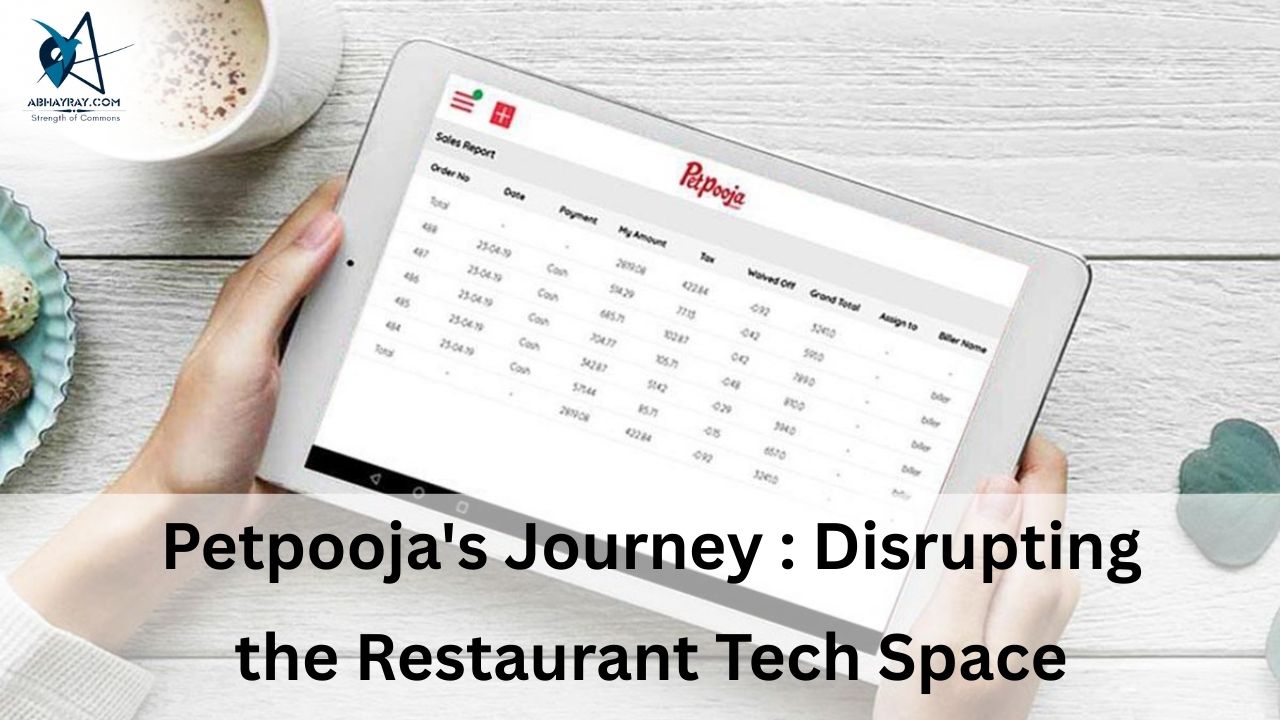Introduction
Petpooja’s strategy often defied conventional startup wisdom. Yet, the Ahmedabad-based startup managed to become one of the most dominant players in India’s restaurant software market, riding on pricing and word of mouth growth. Petpooja, has emerged as a dominant force in the restaurant technology sector by offering a comprehensive, user-friendly point-of-sale (POS) system tailored to the unique needs of restaurants. Their platform streamlines operations by integrating billing, inventory management, and order processing into a single, intuitive interface.
About Petpooja and How it Work
The founders of Petpooja – Apurv Patel and Parthiv Patel started Petpooja with the mindset of making the unorganized sector of the F&B industry into a more systematic and methodical sector. In the initial days of Petpooja in 2011, it started as a delivery service for corporations and multinational corporations. Petpooja is a homegrown brand started with a simple mission- to streamline the unorganized sector of the food industry in India. This comprised various SMBs and made up the biggest chunk of revenue contribution in the Indian restaurant segment; around 90%. Petpooja is the leading next-generation PoS platform for the F&B industry. The company’s legal name is Prayosha Food Services Pvt. Ltd. Its point-of-sale (POS) system runs all of its client’s operations smoothly, allowing its customers to focus on other functions to further expand its restaurant business. The company has over 90,000 clients across India, the UAE, and South Africa. The PoS system of Petpooja involves a billing system, inventory management system, reporting, customizable menus, CRM, and online ordering.
The Petpooja platform processes over 200,000 invoices each day and receives over 50,00,000 API requests every day. The platform is independent of the operating system (Windows, Mac, or Linux) and the browser. Node.JS, Python, PHP, Adobe, MySql, MongoDB, SqlLight, and ReactJS are among the technologies used on the platform. Petpooja works with companies and organizations like Dunzo, IIFL, Bank, PayTM, HDFC NPCI, Zomato, and Swiggy, and by partnering with around 300+ restaurants.
The Onset of Petpooja
The innate humble work culture at Petpooja is because of its humble and visionary beginnings. They started their operations from a one-room office space. The founding duo hired some exceptionally talented individuals who believed in the similar vision as theirs and had the yearning to achieve it.
The initial response to Petpooja POS was tremendously positive. People loved the simplicity of the product, transparent pricing structure, prompt customer support and some never-seen features in other POS. Petpooja had announced itself in a grand fashion through its growing market share. They offered state-of-the-art product and services at the most affordable rate. Literally, at the price of a cup of tea for one day! Slowly the team of 2 grew to a massive team of 200 and they secured our Series-A funding of $2 Mn from Udaan in 2019. This gave them the necessary firepower to upgrade our POS with more features and also work towards advanced products like Kiosk, A1-enabled software, FoodBot (a Robot designed to carry out serving tasks of a waiter in the restaurant), and many more.
Key Takeaways
- Founded in 2011 as a B2B food delivery company, Petpooja has evolved from being just a billing software to a comprehensive SaaS platform for SMB restaurants
- With over 90,000 clients and 300+ integration partners, including Swiggy and Zomato, the 13-year-old startup is a leading player in the restaurant software market
- But Petpooja caters to a challenging market segment, where SMB restaurants have a 50% chance of shutting down
- While Petpooja is growing fast, it still has trouble getting investors. Most industry experts say this is because of its exclusive focus on food services
Strategy of Petpooja’s
The company has bet everything on what most would consider the riskiest segment in Indian SaaS: small restaurants. These aren’t the fancy establishments with deep pockets they’re the family-run eateries and small chains operating on thin margins, typically earning between ₹50 lakh and ₹5 crore annually. This is in contrast to the bigger players including quick service restaurants (QSRs), franchisees, and fine dining that generate revenues starting from ₹10 crore and ranging into several hundred crore annually.
“We handled 7.3 million orders that day, up from our daily average of 5.5 million to 6 million,” says Co-Founder and CEO Parthiv Patel with the relaxed confidence of someone who has heard too many times why his business shouldn’t work. The previous New Year’s Eve (2023), its hnumbers stood at 4.8 million orders.”In terms of website traffic,” he adds matter-of-factly, “I guess only GST and IRCTC are ahead of us.”
Conclusion
As the restaurant technology market continues to grow and evolve, Petpooja’s future looks promising, particularly as it solidifies its position as a leader in providing affordable and user-friendly solutions. Petpooja could explore integrations with food delivery platforms, mobile apps, and digital payment solutions to offer a comprehensive, all-in-one system that addresses the evolving needs of modern restaurant businesses Petpooja to continue focusing on affordability, simplicity, and scalability, ensuring that it stays accessible to SMBs while also meeting the growing demands of larger establishments. If it continues to innovate while staying true to its roots, Petpooja’s future in the restaurant tech industry looks bright, offering solutions that empower restaurants to thrive in an increasingly tech-driven market.
GMICapitals.com RaysVeda.com GetMyStartup.com LawCanal.com GetMyIndia.com ZinCob.com Angeltors.com

